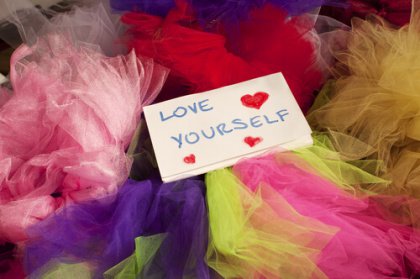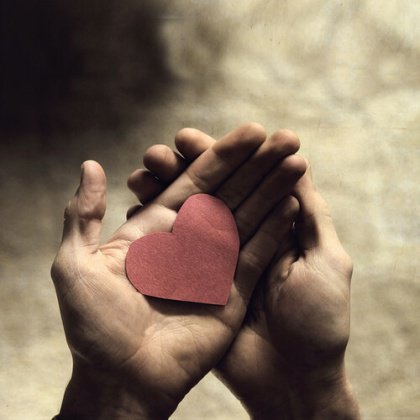First Love Yourself, So You Can Learn to Love Others

Loving oneself is part of a fundamental process in our lives that allows us to be able to love others in an honest way.
“Learning to love oneself is the beginning of an adventure that lasts our whole lives.”
Oscar Wilde
This process spans our entire lives and there are many situations that continuously put us to the test. Disappointments, frustrations, mistakes made, goals not reached, break-ups, depressions; an endless list of daily challenges that we are subjected to and that we let influence our perception of our own personal value.
What determines your value?
Our personal value does not depend on what we achieve or what we have, but rather it depends on the attitude with which we take on each new step of life towards being able to love ourselves unconditionally.
It difficult to give something that you don’t have, and if you don’t have love for yourself, it’s nearly impossible to share love with others. You may think that you are loving others, however you will continuously fall into traps of manipulation, demands, and emotional blackmail.
If we have not learned to love ourselves unconditionally, we search for this love outside of ourselves, in others, in such a way that we becoming completely exposed to the judgement of others.
This type of dependence damages us, to the point that we may beg for love and affection; calling attention to ourselves and exhibiting permissive behavior to get looks, attention, and care from others.
To know if you love yourself unconditionally, ask yourself: Does my personal value depend on external judgments?

Learn to take care of yourself
In our culture, the act of loving oneself is often considered selfish and egotistical. This belief is completely wrong, given that our ability to love others starts with the love that one has for oneself, in turn forming a universal love and love for mankind itself.
The way in which we take care of ourselves has a lot to do with how we are perceived by others, and the state of mind we adopt. When a person fails to take care of him or herself, it can be seen as an attack and a lack of addressing ones own basic needs.
“Taking care of oneself is to always keep yourself in mind. Listen to your own needs. Recognize that we exist and occupy a place in the world, and that we have the right to feel good, and ensure our own well-being in every part of our existence.”
-Fina Sanz-
Incorporating mutual care in our lives allows us to attend to our needs, without putting the needs of others first. It is essential to know what our needs are and to look into them. That is what it means to take care of oneself.

Self-acceptance: an act of compassion
Accepting who we are means accepting our flaws, discovering our skills and our limits, our abilities, virtues, ways in which we prepare ourselves, and accepting ourselves as a whole from a deep and holistic perspective.
Better self-knowledge means greater understanding. When we take care of ourselves and understand ourselves, we are able to move past self-judgement and self-guilt for the mistakes we may have made; in this way we can forge a path towards acceptance of who we truly are.
Through acceptance, as an act of compassion and understanding towards who we are, we can get closer to unconditional love for ourselves, which, in turn, allows us to love others.
By doing this in an open and honest way, we will be able to form relationships that are based on the search for appreciation. By loving ourselves, we will be able to truly commit ourselves to the act of loving others compassionately, and through acceptance.
“All growth needs love, but it must be unconditional love. If love imposes conditions, growth cannot take place completely, because these conditions will intervene.
Love unconditionally, don’t ask for anything in return. You will receive so much without the need to ask for it -you will turn it into something else- but don’t be a beggar. In love, be an emperor. Only give and observe what happens: you will receive a thousand times more in return. But you have to learn the trick. Give the opposite, and you will be a miser; you will give a little and expect a lot in return, and that expectation will destroy all the beauty of your actions.”
-Osho-
Sources consulted:
-Sanz, F. (1995). Loving Bonds (Los vínculos amorosos: amar desde la identidad en la terapia de reencuentro). Kairós.
Loving oneself is part of a fundamental process in our lives that allows us to be able to love others in an honest way.
“Learning to love oneself is the beginning of an adventure that lasts our whole lives.”
Oscar Wilde
This process spans our entire lives and there are many situations that continuously put us to the test. Disappointments, frustrations, mistakes made, goals not reached, break-ups, depressions; an endless list of daily challenges that we are subjected to and that we let influence our perception of our own personal value.
What determines your value?
Our personal value does not depend on what we achieve or what we have, but rather it depends on the attitude with which we take on each new step of life towards being able to love ourselves unconditionally.
It difficult to give something that you don’t have, and if you don’t have love for yourself, it’s nearly impossible to share love with others. You may think that you are loving others, however you will continuously fall into traps of manipulation, demands, and emotional blackmail.
If we have not learned to love ourselves unconditionally, we search for this love outside of ourselves, in others, in such a way that we becoming completely exposed to the judgement of others.
This type of dependence damages us, to the point that we may beg for love and affection; calling attention to ourselves and exhibiting permissive behavior to get looks, attention, and care from others.
To know if you love yourself unconditionally, ask yourself: Does my personal value depend on external judgments?

Learn to take care of yourself
In our culture, the act of loving oneself is often considered selfish and egotistical. This belief is completely wrong, given that our ability to love others starts with the love that one has for oneself, in turn forming a universal love and love for mankind itself.
The way in which we take care of ourselves has a lot to do with how we are perceived by others, and the state of mind we adopt. When a person fails to take care of him or herself, it can be seen as an attack and a lack of addressing ones own basic needs.
“Taking care of oneself is to always keep yourself in mind. Listen to your own needs. Recognize that we exist and occupy a place in the world, and that we have the right to feel good, and ensure our own well-being in every part of our existence.”
-Fina Sanz-
Incorporating mutual care in our lives allows us to attend to our needs, without putting the needs of others first. It is essential to know what our needs are and to look into them. That is what it means to take care of oneself.

Self-acceptance: an act of compassion
Accepting who we are means accepting our flaws, discovering our skills and our limits, our abilities, virtues, ways in which we prepare ourselves, and accepting ourselves as a whole from a deep and holistic perspective.
Better self-knowledge means greater understanding. When we take care of ourselves and understand ourselves, we are able to move past self-judgement and self-guilt for the mistakes we may have made; in this way we can forge a path towards acceptance of who we truly are.
Through acceptance, as an act of compassion and understanding towards who we are, we can get closer to unconditional love for ourselves, which, in turn, allows us to love others.
By doing this in an open and honest way, we will be able to form relationships that are based on the search for appreciation. By loving ourselves, we will be able to truly commit ourselves to the act of loving others compassionately, and through acceptance.
“All growth needs love, but it must be unconditional love. If love imposes conditions, growth cannot take place completely, because these conditions will intervene.
Love unconditionally, don’t ask for anything in return. You will receive so much without the need to ask for it -you will turn it into something else- but don’t be a beggar. In love, be an emperor. Only give and observe what happens: you will receive a thousand times more in return. But you have to learn the trick. Give the opposite, and you will be a miser; you will give a little and expect a lot in return, and that expectation will destroy all the beauty of your actions.”
-Osho-
Sources consulted:
-Sanz, F. (1995). Loving Bonds (Los vínculos amorosos: amar desde la identidad en la terapia de reencuentro). Kairós.
This text is provided for informational purposes only and does not replace consultation with a professional. If in doubt, consult your specialist.







